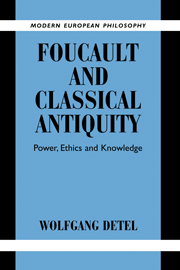3 - The scientific regimen
Summary
According to Foucault, classical medical texts on the guidelines for an ideal regimen provide further instructive illustrations of the ways in which sexuality was problematised in the ancient world. One of the most important results of his analysis of these texts is that ancient dietetics develops a comprehensive perspective of bodily activity: it regulates nourishment, physical exercise, sleep, bathing and sometimes sexuality too. Foucault points to a number of important parameters that ancient dietetics relies on – the quantity, the overall state of the body, the length of time, the season, the general climate, general human nature; nor should the relationship of all these aspects to each other be forgotten. As Foucault sees it, ancient dietetics does not just suggest isolated rules for good health, but an overall regulation of life that covers both the mental and the moral aspect. Ancient dietetics pre-supposes not only that the care of the body and of the soul are mutually dependent on each other, it also maintains that mental discipline is a precondition of a successful regimen; above all, the primary aim of dietetics is not the unqualified prolongation of life, but the optimisation of the quality of life, that is the maximisation of pleasurable health within natural bounds. This goal depends on a concept of the good life, for following rational dietetic regulations is an indication of the mental self-control which is an intrinsic part of a good life.
- Type
- Chapter
- Information
- Foucault and Classical AntiquityPower, Ethics and Knowledge, pp. 93 - 117Publisher: Cambridge University PressPrint publication year: 2005

